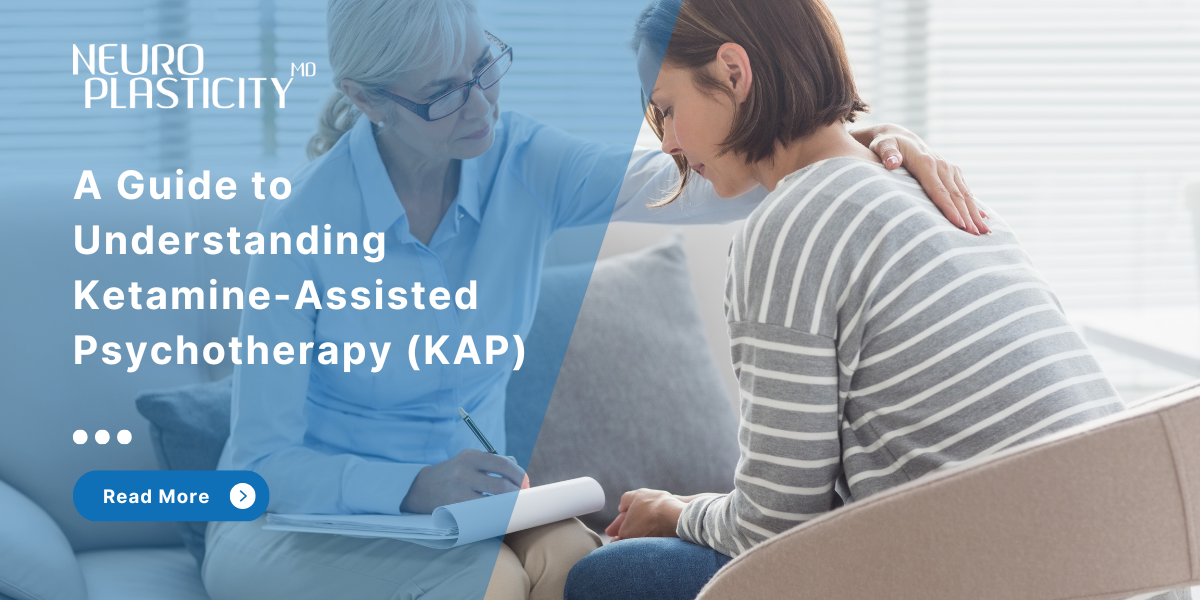Ketamine for Anxiety and Mental Health: A Revolutionary Treatment Changing...
Continue Reading
The way we approach treatment for mental health is changing and Ketamine-Assisted Psychotherapy (KAP) is leading the charge. At Neuroplasticity MD, we combine psychotherapy and ketamine therapy for a profoundly effective treatment approach. KAP is particularly effective for depression, PTSD, anxiety, and other mood disorders that have not responded to conventional treatments because it provides relief quickly and sustains changes for a long time.
As a therapist, I am so excited to join Neuroplasticity MD to provide KAP to patients who very desperately need effective treatments. By combining the neuroplasticity effects of ketamine and therapy, patients learn how to process emotions, change negative thought patterns, and enjoy good mental health permanently.
KAP is a combination of therapies used to treat mental health disorders, using ketamine as its primary tool. Ketamine, with its distinctive properties, provides an altered state of consciousness that is very useful for psychotherapy in enabling people to process and integrate their experiences for major self advancement.
Ketamine works in a way that is different from most medications, and instead of weeks or months, the medication start working in a matter of hours or days on severe depression suffers or people with Post-Traumatic Stress Disorder (PTSD) or suicidal ideation.
Prior to starting treatment with ketamine, we do one to three preparation sessions that include:
The intention is to help patients achieve psychological readiness and comfort for the ketamine experience.
Ketamine can be given to patients as following:
Patients enter a dream-like state, or what feels like a deeply relaxed state, during which a spiritual awakening might occur. Patients’ experiences can greatly vary – while some notice a certain detachment from pain they suffered before, others report light imagery and emotions that lead to more profound healing processes.
This state allows for unconscious negative thinking to be broken so that new neural pathways can be formed and emotions processed. This therapy-like alleviation is not usually effective with traditional talk therapy.
We have an integration therapy session within the 24-48 hours range post a ketamine session in a bid to assist the patients to:
This is where neurobiological change is achieved. In a neuroplastic brain, integration therapy takes place after the patient has already performed these elements of behavior change: perspective shift and coping strategy.
Regular antidepressants may take around a couple of weeks to become effective, while patients can receive ketamine dosage in hours. Patients suffering depression, PTSD, or even suicidal ideations will benefit understanding this as it allows immediate optimism.
Patients have the ability to view and approach life from different angles, allowing for emotions that have been previously locked away to be experienced and insights that conventionally does not exist to be uncovered.
KAP enables patients to escape from habitual destructive thinking and helps them replace them with healthier ones. This is especially true for patients who seem to be paralyzed and enveloped in depression treatment or trauma responses.
Here at Neuroplasticity MD, KAP is executed within a safe environment with the presence of a physician, thus ensuring the safety of the patient physically and emotionally. The experience is enriched by the presence of a qualified therapist who helps patients in meaningful ways to heal.
KAP is more useful in treating patients that are suffering from:
✔ Depression that does not seem to go away
✔ A variety of anxiety disorders
✔ Post-traumatic stress disorder (PTSD)
✔ Thoughts of suicide
✔ Sad which comes on in the winter months
✔ Obsessive-compulsive disorder (OCD)
✔ Other emotional disorders
A sizeable population that has failed traditional medication have their hopes rekindled and pain alleviated with KAP.

The activation of an ‘inner healer’ is the most crucial step in Ketamine-Assisted therapy and it refers to the ability to transcend issues that every person possesses.
During integration therapy the patient becomes aware his/her strengths, sheds negative self-beliefs, and adopts newly found empowering strategies to approach life with distinctions of intent, clarity and purpose. In the long run, they learn to depend on their inner healer, ensuring their improvement lasts far beyond the ketamine experience.
Ketamine Assisted Therapy may improve symptoms almost immediately. Nonetheless, long-term healing will require further support. At Neuroplasticity MD, we guarantee that patients can easily reconnect with their primary therapists after the booster or maintenance treatment phase.
We collaborate with therapists, doctors, and the patients themselves, to formulate a united system that makes the most KAP and allows for further development to happen.
Assisted psychotherapy using ketamine NJ is a new finding in the realm of mental health. It gives hope and healing to the patients who have lost faith in other conventional methods to help improve their conditions.
We at Neuroplasticity MD focus on helping patients throughout the journey of healing so that they can rediscover themselves and the life waiting for them.
Contact us today and find out more about KAP therapy and how it can change the quality of your life for the better.
Ketamine for Anxiety and Mental Health: A Revolutionary Treatment Changing...
Continue ReadingFast-Acting Relief: Exploring the Power of Ketamine for Anxiety Treatment...
Continue ReadingKetamine Treatment Cost NJ Help Is Finally Here “Trauma Comes...
Continue ReadingDisclaimer: The medical information on this site is provided as an information resource only, and is not to be used or relied on for any diagnostic or treatment purposes. This information is not intended to be patient education, does not create any patient-physician relationship, and should not be used as a substitute for professional diagnosis and treatment. Always consult your healthcare provider before making any healthcare decisions or for guidance about a specific medical condition.